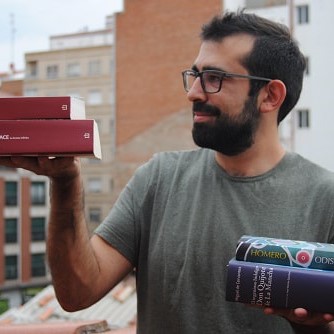
Víctor Gutiérrez Sanz
| AREA | RESEARCH GROUP | INSTITUTE |
|---|---|---|
| Humanities and Social Sciences | Cultural produsage in social networks |
I hold a PhD in Literary Theory and Comparative Literature from the University of Valladolid (2019, cum laude, international doctorate, Extraordinary Doctorate Award from the UVa), a BA in Journalism (2013, First National Award for University Academic Performance, Extraordinary Award from the UVa) and in Literary Theory and Comparative Literature (2014, First National Award for University Academic Performance, Extraordinary Award from the UVa) from the University of Valladolid. He has also completed the Master's Degree in Advanced Philological Studies (2015, Extraordinary Prize from the UVa) and the Master's Degree in Teacher Training for Compulsory Secondary Education and Baccalaureate (specialising in Spanish Language and Literature, 2020, UNED).
After working for different local media (Aquí en Valladolid, Enclave Revista and El Norte de Castilla) I have focused my professional career in the university world. I have carried out research stays in prestigious universities such as Nottingham, Amsterdam or Pompeu Fabra University in Barcelona and presented papers in Oxford, Buenos Aires, Mexico City or Lausanne. I am currently working as a Margarita Salas postdoctoral researcher.
I have taught different courses on Comparative Literature and Literary Theory in the university world, specialisation courses in rhetoric and oratory in secondary and high school and creative writing workshops with Fuentetaja, as well as moderating virtual reading clubs for the Community of Madrid.
The personal research project "Poetic-rhetorical analysis of Artificial Intelligences" (funded by a Margarita Salas Recualification Grant from the University of Valladolid) aims to bring a humanistic perspective to both the design and evaluation of conversational Artificial Intelligences, commonly known as "bots". The approach to achieve this goal will be multidisciplinary (psychology, discourse analysis, semiotics, linguistics, philosophy, etc.), although the starting point will be two classical disciplines: poetics and rhetoric (both framed within modern literary theory).
We consider that the study of conversational AIs from these disciplines offers a novel perspective to the field of study. On the one hand, rhetorically based analysis will allow us to approach both the production and reception of AIs with a persuasive-communicative approach. On the other hand, poetics will allow us to address the limits of these devices under parameters such as verisimilitude and creativity.

